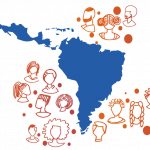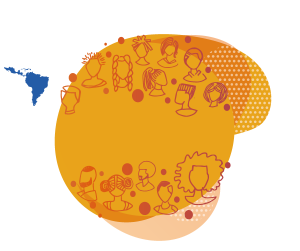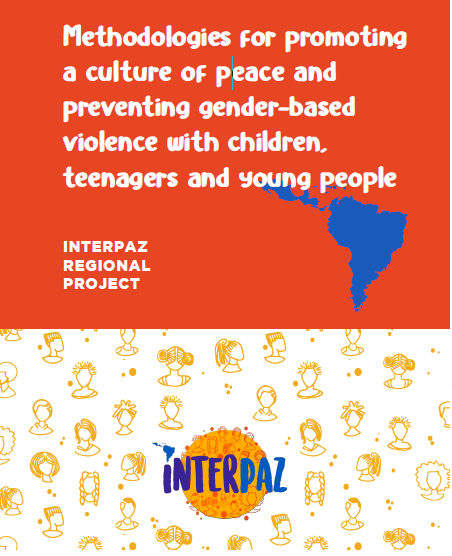Publications
 The goal of a culture of peace is to ensure that conflicts resulting from human relations are settled in a non-violent manner and in accordance with traditional peacebuilding values: justice, freedom, equity, solidarity, tolerance, and respect for human dignity.
The goal of a culture of peace is to ensure that conflicts resulting from human relations are settled in a non-violent manner and in accordance with traditional peacebuilding values: justice, freedom, equity, solidarity, tolerance, and respect for human dignity.
Peace is understood as an individual sentiment, which is experienced in interpersonal relationships, and also exercised as a right.
This challenge is especially relevant in Latin America, a region marked by violence and social inequality, the effects of which are amplified on certain segments of the population. Children, adolescents, and youths; women; LGBTQI+ people; indigenous people; Afro-descendant populations; and persons with disabilities are some of the groups who suffer the greatest violation of rights within contexts of economic and social exclusion, exploitation, environmental destruction, and discrimination based on gender, sexual orientation, ethnicity, race, origin, among other factors.
In this scenario, promoting a culture of peace is directly correlated to the fight against the multiple forms of violence sustained by the racist and patriarchal capitalist system: the State violence and violence perpetrated by armed groups, the violence against women and girls, racial oppression, recruitment and murder of teenagers and young people by armed groups, the exploitation and corporal punishment of children, among others. It’s impossible to talk about living in a culture of peace without social justice and the assurance of universal human rights, such as the right to education, health, food and to live in a safe and healthy environment.
In this context, the commitment to eliminate violence against women and LGBTQI+ people is directly connected to the fight for social justice. For women and girls, violence is frequently interlaced with other factors of discrimination based on ethnic group, race, class, education, disability etc., which is defined as intersectionality. Following this logic, for example, Afrodescendant or Indigenous young women living with socioeconomic difficulties suffer discrimination and violence in specific and intensified ways.
To highlight and be active in the fight for gender equality and equity in the process of building a culture of peace means recognizing the impacts on the lives of women and LGBTQI+ people of a system that normalizes gender-based violence that gets translated into physical, sexual and psychological violence, feminicides, discrimination, misogyny, definition of roles that men and women can play in society (and the material consequences of this), control of sexuality and the bodies of girls, female teenagers, young and adult women, among other forms of oppression.
It also implies the acknowledgement of the historical inequality experienced by women and the need to promote public policies that ensure that girls, young and adult women enjoy autonomy and conditions of equality, exercise their rights as citizens and have a voice and influence in the decision-making process.
A culture of peace is a concept under ongoing construction, that transforms itself according to the social, economic, political and cultural contexts. Each society finds its own answers to achieve peace and its construction is a challenge that requires questioning previous knowledge and overcoming patriarchal cultural norms.
The goal of Interpaz Regional Project is to promote a culture of peace and gender equity centered around the active participation of children, adolescents, and youths. The Project’s actions promote initiatives and methodologies geared towards non-violent conflict resolution, while advancing respect for diversity, support for dialogue, and a break from cultural norms that naturalize violence, particularly against girls and women.

FOR MORE INFORMATION
Convention on the Rights of the Child
Several articles in this United Nations Convention refer to the promotion of peace as a means to protect children from all forms of violence, prepare them for a responsible life in a free society, advance their right to fully participate in cultural and artistic life, among other guarantees. Among the principles set forth by this Convention is that of non-discrimination, including gender-based discrimination.
Declaration and Programme of Action on a Culture of Peace
This United Nations Declaration (1999) states that promoting a culture of peace requires the elimination of all forms of discrimination based on race, color, sex, language, religion, political opinion or other national, ethnic or social origin, property, disability, birth or other status.
Sustainable Development Goal (SDG) 16
To end all forms of violence against children, adolescents, and youths by 2030 is among the commitments entered into by the Member States of the United Nations.
Inter-American Convention on the Prevention, Punishment and Eradication of Violence against Women
This instrument, adopted by the Organization of American States (OAS), defines violence against women, upholds the right of women to live a life free from violence, and denotes violence as a violation of human rights and fundamental freedoms.
Convention on the Elimination of All Forms of Discrimination against Women
This United Nations international treaty promotes the idea of substantive equality, which requires actionable measures to ensure equal access, opportunity, and outcome for girls and women. This instrument is the only human rights treaty that affirms the right of women to decide freely and responsibly on the number and spacing of their children and to have access to the information, education, and means to enable them to exercise these rights.
Sustainable Development Goal (SDG) 5
A common objective to all other United Nations sustainable development goals, SDG 5 aim is to achieve gender equality and empower all women and girls by 2030. One of its targets is to eliminate all forms of violence against all women and girls both in the public and private spheres.

Intended for workers from social organizations and educators working in Latin America and other parts of the world, this publication presents the methodologies developed by the partner organizations of Interpaz aimed at promoting a culture of peace, preventing violence against women and girls, and encouraging the participation and protagonism of children, teenagers and young people in the reclaiming of their rights. The methodologies use sports, arts, games and principles from popular education and can be applied to many different audiences.
The following are part of the Interpaz Regional Project: Ação Educativa (Brazil), Corporación Amiga Joven (Colombia), Museo de la Palabra y la Imagen (El Salvador), Centro de Servicios Educativos en Salud y Medio Ambiente – Cesesma (Nicaragua), with regional coordination by terre des hommes Germany.
Caso o download não inicie clique aqui para baixar.
Caso o download não inicie clique aqui para baixar.
Caso o download não inicie clique aqui para baixar.
Caso o download não inicie clique aqui para baixar.
Caso o download não inicie clique aqui para baixar.
Caso o download não inicie clique aqui para baixar.